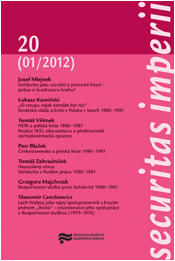„O vstupu vojsk nemůže být řeč“ Sovětská vláda a krize v Polsku v letech 1980–1981
Military Intervention Can’t Even Be Considered“ The Soviet Government and the Crisis in Poland in 1980–1981
Author(s): Łukasz Kamiński Subject(s): Military history, Government/Political systems, Security and defense, Post-War period (1950 - 1989), History of Communism, Socio-Economic Research
Published by: Ústav pro studium totalitních režimů
Keywords: USSR; Poland; 1980-1981;
Summary/Abstract: This study focuses on the position adopted and measures taken by the Soviet Union as the leading state in the Soviet bloc towards the People’s Republic of Poland from the creation of the Solidarity independent trade union in August 1980 until the declaration of a state of emergency in December 1981. The author draws on the preserved records of Politburo meetings of the Soviet Communist Party’s Central Committee, the diplomatic correspondence of representatives of satellite Communist states and other sources. From the off, the Soviet leadership regarded the appearance of Solidarity in Poland as a movement aimed at counter-revolution and unequivocally rejected it. At the same time – in contrast to leaders of satellite Communists parties – it was relatively guarded in its accusations against the leading representatives of the Polish United Workers’ Party. The records presented show that from the start of the Polish crisis Soviet politicians exhorted their Polish comrades to adopt a forceful approach against the counterrevolutionary forces. However, at the same time, externally and among themselves, they rejected from the beginning the possibility of a Soviet military intervention aimed at establishing order on Polish soil. The Soviet leadership, as the author shows, in the end pressed for the replacing of Polish party leader Kania and supported his deputy General Jaruzelski, along with his decision to employ force to liquidate the growing mass extra-party movement. However, the Soviets had already made it clear that they regarded a Soviet military intervention on Polish territory as out of the question, which the author again supports with quotations from key Politburo members Andropov and Suslov. The author attributes the Soviet position – which was formulated at the beginning of the so-called Polish crisis and did not change for as long as it continued – to the country’s experience of the invasion of Czechoslovakia in 1968, the outcome of its intervention in Afghanistan, and fears of Western economic sanctions.
Journal: Securitas imperii
- Issue Year: 2012
- Issue No: 20
- Page Range: 36-43
- Page Count: 8
- Language: Czech

